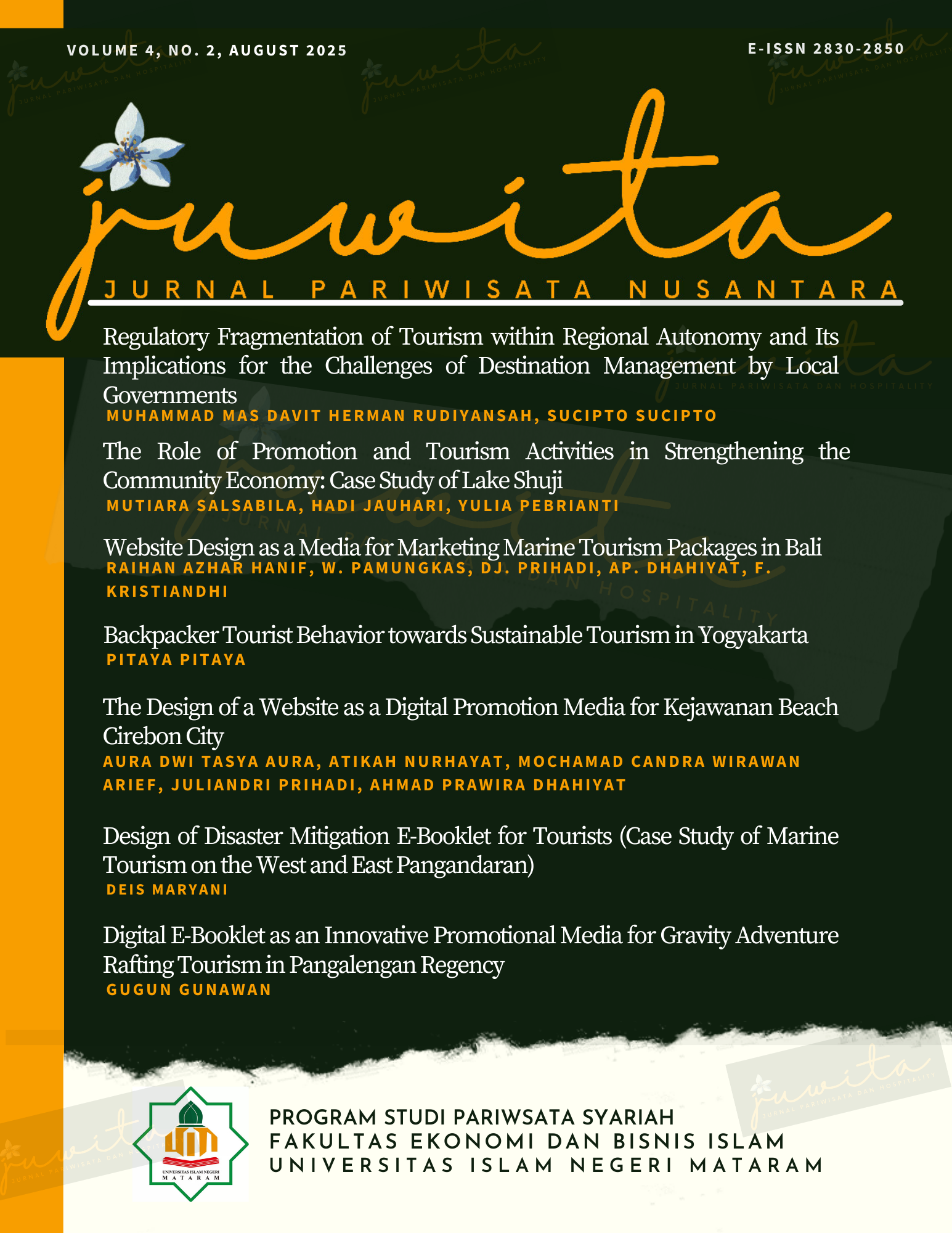The Role of Promotion and Tourism Activities in Strengthening the Community Economy: Case Study of Lake Shuji
Main Article Content
Abstract
Purpose: Tourism holds great potential for enhancing community economic growth, especially in rural areas. This study aims to analyze the influence of tourism promotion and tourism activities on the economic well-being of communities around Danau Shuji, Lembak Village, Muara Enim Regency.
Method: A quantitative method with multiple linear regression analysis was used, based on data from 98 purposively selected respondents. The results show that both promotion and tourism activities significantly influence economic well-being (R² = 0.536).
Result: This study concludes that community-based tourism development requires the strengthening of digital promotion, diversification of attractions, and inclusive institutions to ensure long-term economic and social benefits.
Contribution: Partially, tourism activities had a greater impact than promotion. Tourism activities have created new income sources, opened job opportunities, and encouraged the growth of local MSMEs. In addition to economic impact, community participation in tourism also fosters social transformation, including the increasing involvement of youth and women.
Downloads
Article Details

This work is licensed under a Creative Commons Attribution-ShareAlike 4.0 International License.
References
Basuki, H. (2020). Strategi promosi destinasi wisata dan implikasinya terhadap daya saing pariwisata daerah. Jurnal Ilmu Pariwisata, 12(2), 85–97.
Brida, J. G., Cortes-Jimenez, I., & Pulina, M. (2019). Tourism-led growth hypothesis: Empirical evidence from the literature. Tourism Management Perspectives, 30, 38–49. https://doi.org/10.1016/j.tmp.2019.01.002
Clark, C. (1931). The conditions of economic progress. London: Macmillan.
Ginting, N., & Siregar, R. (2022). Dampak pariwisata berbasis masyarakat terhadap kesejahteraan lokal: Studi di Danau Toba. Jurnal Ekonomi dan Pembangunan, 20(1), 57–68.
Inskeep, E. (1991). Tourism planning: An integrated and sustainable development approach. New York: Van Nostrand Reinhold.
Kementerian Pariwisata dan Ekonomi Kreatif Republik Indonesia. (2023). Laporan tahunan pengembangan destinasi dan promosi wisata nasional. Jakarta: Kemenparekraf.
Kotler, P., & Keller, K. L. (2009). Marketing management (13th ed.). New Jersey: Pearson Prentice Hall.
Okazaki, E. (2008). A community-based tourism model: Its conception and use. Tourism Management, 29(3), 511–529. https://doi.org/10.1016/j.tourman.2007.05.005
Pengelola Danau Shuji. (2025). Data statistik kunjungan wisatawan Danau Shuji tahun 2020–2024. Lembak: Laporan Internal.
Pranaditya, D. (2021). Peran UMKM dalam pengembangan ekonomi lokal melalui pariwisata. Jurnal Ekonomi dan Bisnis Indonesia, 6(1), 45–53.
Putra, I. M., & Darma, I. K. (2020). Strategi promosi digital destinasi wisata berbasis media sosial. Jurnal Destinasi Pariwisata, 8(1), 23–34.
Scheyvens, R. (2002). Tourism for development: Empowering communities. Harlow: Prentice Hall.
Tolinggi, F. E., Manoppo, H., & Rante, Y. E. (2021). Pengaruh promosi dan kunjungan wisatawan terhadap kesejahteraan masyarakat sekitar objek wisata di Sulawesi Utara. Jurnal Pembangunan Wilayah dan Kota, 17(1), 25–34.
Undang-Undang Republik Indonesia Nomor 10 Tahun 2009 tentang Kepariwisataan.

